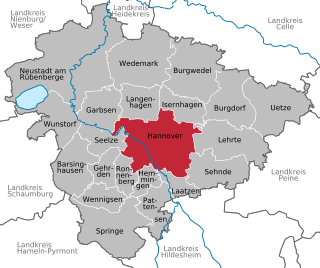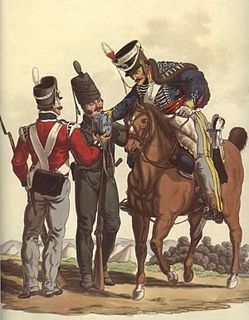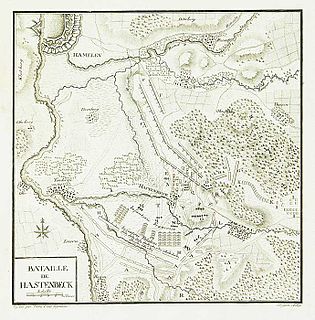
The prince-electors, or electors for short, were the members of the electoral college that elected the emperor of the Holy Roman Empire.

Hanover is the capital and largest city of the German state of Lower Saxony. Its 535,061 (2017) inhabitants make it the 13th-largest city in Germany as well as the third-largest city in Northern Germany after Hamburg and Bremen. Hanover's urban area comprises the towns of Garbsen, Langenhagen and Laatzen and has a population of about 791,000 (2018). The Hanover Region has approximately 1.16 million inhabitants (2019).

The Franco-Swedish War or Pomeranian War was the first involvement by Sweden in the Napoleonic Wars. The country joined the Third Coalition in an effort to defeat France under Napoleon Bonaparte.

Prince Adolphus, Duke of Cambridge, was the tenth child and seventh son of the British king George III and Charlotte of Mecklenburg-Strelitz. He held the title of Duke of Cambridge from 1801 until his death. He also served as Viceroy of Hanover on behalf of his brothers George IV and William IV. His granddaughter Princess Victoria Mary of Teck, daughter of Princess Mary Adelaide, was the wife of King George V, and paternal grandmother of Queen Elizabeth II.
Hanover is a territory that was at various times a principality within the Holy Roman Empire, an Electorate within the same, an independent Kingdom, and a subordinate Province within the Kingdom of Prussia. The territory was named after its capital, the city of Hanover, which was the principal town of the region from 1636. In contemporary usage, the name is only used for the city; most of the historical territory of Hanover forms the greater part of the German Land of Lower Saxony but excludes certain areas.

Adolphe Édouard Casimir Joseph Mortier, 1st Duke of Trévise was a French military commander and Marshal of the Empire under Napoleon I, who served during both the French Revolutionary Wars and the Napoleonic Wars. He was one of 18 people killed in 1835 during Giuseppe Marco Fieschi's assassination attempt on King Louis Philippe I.

The King's German Legion was a British Army unit of mostly expatriated German personnel during the period 1803–16. The legion achieved the distinction of being the only German force to fight without interruption against the French during the Napoleonic Wars.

Bremen-Verden, formally the Duchies of Bremen and Verden, were two territories and immediate fiefs of the Holy Roman Empire, which emerged and gained imperial immediacy in 1180. By their original constitution they were prince-bishoprics of the Archdiocese of Bremen and Bishopric of Verden.

The Kingdom of Hanover was established in October 1814 by the Congress of Vienna, with the restoration of George III to his Hanoverian territories after the Napoleonic era. It succeeded the former Electorate of Hanover, and joined 38 other sovereign states in the German Confederation in June 1815. The kingdom was ruled by the House of Hanover, a cadet branch of the House of Welf, in personal union with the United Kingdom of Great Britain and Ireland since 1714. Since its monarch resided in London, a viceroy, usually a younger member of the British Royal Family, handled the administration of the Kingdom of Hanover.

Charles William Ferdinand, Duke of Brunswick-Lüneburg, Prince of Brunswick-Wolfenbüttel was the Prince of Brunswick-Wolfenbüttel and Duke of Brunswick-Lüneburg and a military leader. His titles are usually shortened to Duke of Brunswick in English-language sources.

Zeven [] is a town in the district of Rotenburg, in Lower Saxony, Germany. It has a population of around 14,000. The nearest large towns are Bremerhaven, Bremen and Hamburg. It is situated approximately 22 km northwest of Rotenburg, and 40 km northeast of Bremen. Zeven is also the seat of the Samtgemeinde Zeven.

The Electorate of Hanover was an Electorate of the Holy Roman Empire, located in northwestern Germany and taking its name from the capital city of Hanover. It was formally known as the Electorate of Brunswick-Lüneburg. For most of its existence, the electorate was ruled in personal union with Great Britain and Ireland following the Hanoverian Succession.
The battle of the Göhrde was a battle of the War of the Sixth Coalition on 16 September 1813 between French and Coalition troops at Göhrde in Germany. The French troops were defeated and withdrew to Hamburg.

Johann Ludwig Reichsgraf von Wallmoden-Gimborn was a German lieutenant-general and art collector.
Events from the year 1803 in France.

The Invasion of Hanover took place in 1757 during the Seven Years' War when a French army under Louis Charles César Le Tellier, duc d'Estrées advanced into the Electorate of Hanover and neighbouring German states following the Battle of Hastenbeck. French forces overran most of Hanover forcing the Hanoverian Army of Observation, intended to defend the Electorate, to Stade on the North Sea coast. At the Convention of Klosterzeven the Duke of Cumberland agreed to disband his army and acknowledge the French occupation of the Electorate.

In the siege of Hamelin or siege of Hameln, First French Empire forces captured the fortress of Hamelin from its garrison composed of troops from the Kingdom of Prussia. The siege was begun by the VIII Corps under French Marshal Édouard Adolphe Casimir Joseph Mortier. The marshal initially left General of Division Jean-Baptiste Dumonceau in charge of operations. General of Division Anne Jean Marie René Savary soon arrived to conduct negotiations with the Prussian commander General Karl Ludwig von Lecoq, who was quickly persuaded to surrender. Technically, the operation from the War of the Fourth Coalition was a blockade because a formal siege never took place. Hamelin is located 36 kilometers southwest of Hanover.
Karl Ludwig von Lecoq or Karl Ludwig von Le Coq, born 23 September 1754 – died 14 February 1829, of French Huguenot ancestry, first joined the army of the Electorate of Saxony. He later transferred his loyalty to the Kingdom of Prussia and fought during the French Revolutionary Wars, earning a coveted award for bravery. While serving variously as a staff officer and diplomat, he became renowned as an expert cartographer. In 1806 he was entrusted with command of the forces in northwest Germany. Cut off from the main body of the Prussian army after the disaster at the Battle of Jena-Auerstedt, he concentrated his troops in the fortress of Hameln. After a brief siege, he surrendered his troops to an inferior force of enemies. For this, he was sentenced to life imprisonment. However, he was later pardoned and continued his map-making until he went blind.

Major-general Friedrich Otto Gebhard von Kielmansegg was a German soldier and officer in the service of the Kingdom of Hanover who fought during the Waterloo Campaign.
Events in the year 1803 in Germany